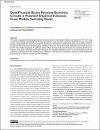Does Financial Sector Promote Economic Growth in Pakistan? Empirical Evidences From Markov Switching Model
| Author | Rahman, Abdul |
| Author | Khan, Muhammad Arshad |
| Author | Charfeddine, Lanouar |
| Available date | 2022-12-27T08:14:14Z |
| Publication Date | 2020 |
| Publication Name | SAGE Open |
| Resource | Scopus |
| Abstract | This study investigates the financial development-economic growth relationship in Pakistan over the period 1975-2017 using the Markov Switching methodology. The financial development index has been constructed using the principal component analysis. Unexpectedly, the empirical result shows that financial development contributing negatively to economic growth in the high and the low economic growth regimes in Pakistan. Moreover, the results indicate that labor force retards economic growth with a higher magnitude. A significant positive effect of gross fixed capital formation on economic growth is also observed. The results reveal that policymakers may revisit the financial development policies so that the financial sector may contribute positively to economic growth process in Pakistan. In this respect, more steps are needed to further liberalize the financial sector to enhance economic growth in Pakistan. The Author(s) 2020. |
| Language | en |
| Publisher | SAGE Publications Inc. |
| Subject | economic growth financial development Markov switching analysis Pakistan principal component analysis |
| Type | Article |
| Issue Number | 4 |
| Volume Number | 10 |
Files in this item
This item appears in the following Collection(s)
-
Finance & Economics [481 items ]


